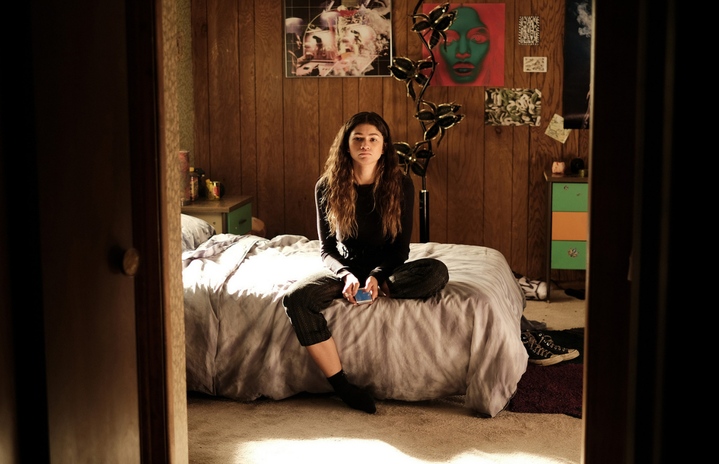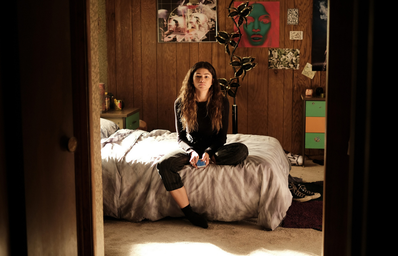Since its premiere in 2019, Euphoria has amassed an impressive viewing, holding the title as the most-watched show on HBO and HBO Max. The season two premiere last January has been viewed about 19 million times on both platforms, more than two-and-a-half times the viewership of last season’s premiere. Much of the show’s success has been credited to its talented cast and stunning visuals, as well as its creator, showrunner, writer, and director of all but three episodes, Sam Levinson. So much of the show is a product of Levinson’s direct involvement—a recovering drug addict, Levinson has said much of the show is based on his life—which is why he is both praised for its accomplishments and blamed for its pitfalls. As successful as Euphoria has become, it is equally polarizing.
The show is based on an Israeli program of the same name and mirrors a similar premise, following a group of high schoolers as they navigate the difficulties of their teenage years and the dangers of drug addiction. Zendaya stars as Rue Bennett, a 16 year-old drug addict, and became the youngest performer to win for lead actress in a drama at the 2020 Emmy Awards. She often reminds viewers, typically via social media, that the program is for mature audiences and should only be watched if they feel comfortable or safe enough to do so.
Also serving as executive producer of the show, Zendaya is not only closely connected with Euphoria but with Rue, who she expresses a deep love and empathy for. Prior to episode five of season two, one of the most visceral episodes of the series, Zendaya released a statement on Instagram describing her relationship with her character and what she hopes to achieve with her performance:
It’s my hope for people watching that they still see her [Rue] as a person worthy of their love. And worthy of their time, and that she has a redemptive quality still and that we still see the good in her even if she can’t see it in herself.
I think that if people can go with her through that, and get to the end, and still have hope for her future, and watch her make the changes and steps to heal and humanize her through her sobriety journey and her addiction, then maybe they can extend that to people in real life.
The beauty of this sentiment is muddied by the show’s tendency to depict surrounding themes so extremely. Euphoria has often been criticized by viewers for its depiction of nudity and violence with some fans even accusing the program of glorifying drug addiction.
Journalism student Mary Grace Purser (‘24) was familiar with such criticisms when she began watching the series earlier this year. Discussing what the show gets right or wrong, she says, “I agree that the way it oversexualizes teens (and the cast itself) is gross and unhealthy. I do, however, feel the drug abuse and addiction portrayal in the show is better than what I expected. It gives a very authentic depiction of what drug abusers look and act like, how recovery works, how people relapse, et cetera. I think it’s a very honest display of what happens when you become an addict but despite showing how drugs can ruin your life and relationships, I still feel it makes them look edgy or as some kind of mature, macabre lifestyle teens can aspire to.”
For all of the ways Zendaya excels in depicting Rue’s battle with drug addiction, many of the teens around her—played by mid- to late-20 year-olds—abuse the same drugs without consequences. This unequal portrayal may glamorize drug use when characters besides Rue are featured, threatening to detract from the show’s overall message.
This message is further challenged by what Purser refers to as the oversexualization of teens, a subject fans have criticized fervently. There is a gratuitous amount of nudity included in the show, though women are more often objectified than their male cast mates. Sydney Sweeney, who portrays Cassie Howard, is often pointed to in discussions of how the show exploits women, though she says she does not feel mistreated by the show nor by Levinson. In an interview with The Independent, Sweeney explained, “I’m very proud of my work in Euphoria. I thought it was a great performance. But no one talks about it because I got naked.” She later adds that Levinson always listens to her when she expresses her discomfort going into certain scenes and cut out some nudity per her request.
Still, episode two of the second season features an almost entirely nude montage of Cassie, and the character’s nudes have been shared through social media with Sweeny’s real-life family tagged in them. Cassie is not the only woman who has been exposed on the show, but the persistent sexualization of her character and other underage characters is not only a topic of extreme distaste but a distraction from the show’s focus on substance abuse and recovery.
Visual Media Arts student Ruby Brooks (‘24) correlates these elements, the portrayal of drug addiction and sexualization, with shock value, something that has become integral to Euphoria. She expresses that sometimes these themes are important to the plot and sometimes are unnecessary, but it is hard to distinguish where the line is drawn depending on your view of film and art. Commenting on the show’s gratuitous nudity, Brooks says, “I think it still would have been a successful show without it, that’s the line of unnecessary. It’s like, okay, does the show need this to be successful? No? And it’s still there, then it’s a little, like, why is it there? So, I think you could definitely take out some of the nudity and it would be just as well. But I don’t think there’s anything inherently wrong with it being there. It just depends on the scene.”
The show’s teetering between a romanticized drama and harrowing portrayal of addiction makes it a spectacle. In creating such a spectacle, however, Euphoria threatens to diminish its own impact. Toying with the discomfort of its audience is a dangerous game, as the show risks losing the connection Zendaya referred to in her Instagram statement: the ability for a viewer to stand beside Rue in her darkest moments and reflect that support towards someone struggling in the real world.
Euphoria is unafraid to confront hard topics head-on. The show’s bravery, or possible insensitivity, keeps it at the forefront of the pop culture conversation. Whether this is a positive quality about the program is difficult to determine, so long as it contributes to a positive impact on its audience. As a fan of the show, Brooks thinks being faced with these hard topics and talking about them is a good thing, but “Do I think they’re always handled in the best way possible? No. But, they’re making people talk about it, so that’s always a good thing, I think.” In regard to the show’s ability to potentially and positively influence audiences, these hard topics can and should be addressed. But in making a habit out of crossing the line of what is and is not acceptable, perhaps Euphoria should proceed with caution.


